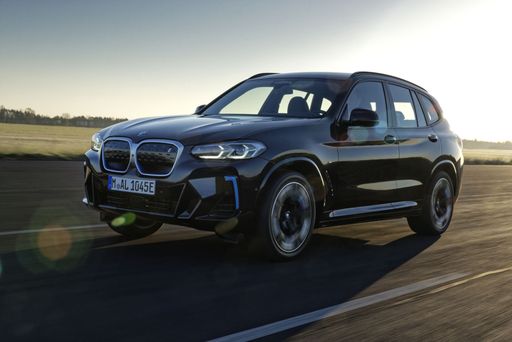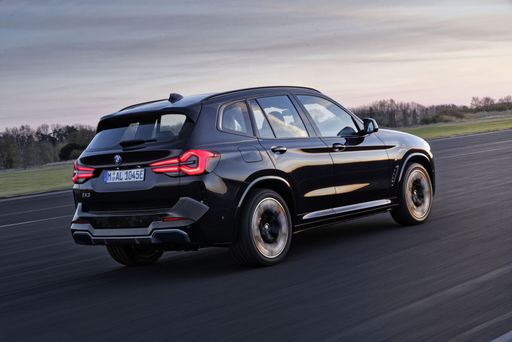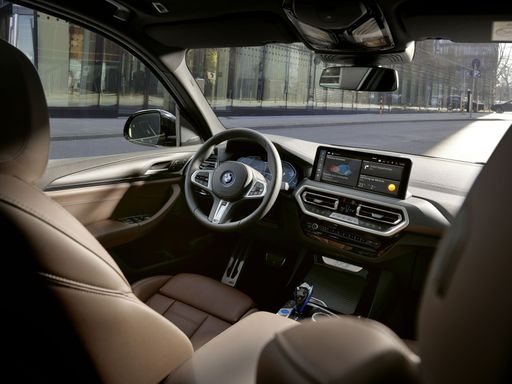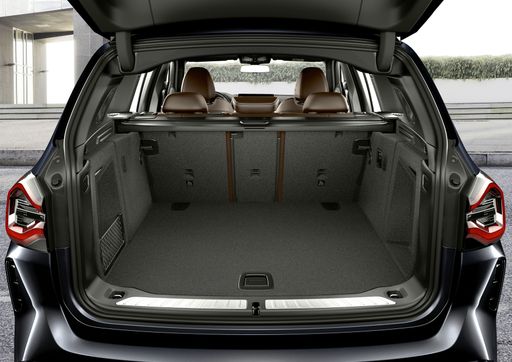BMW iX3 vs Hyundai IONIQ 9 - Differences and prices compared
Compare performance (469 HP vs 428 HP), boot space and price (59100 £ vs 58700 £ ) at a glance. Find out which car is the better choice for you – BMW iX3 or Hyundai IONIQ 9?
Costs and Efficiency:
Price and efficiency are often the first things buyers look at. Here it becomes clear which model has the long-term edge – whether at the pump, the plug, or in purchase price.
Hyundai IONIQ 9 has a slight advantage in terms of price – it starts at 58700 £ , while the BMW iX3 costs 59100 £ . That’s a price difference of around 343 £.
In terms of energy consumption, the advantage goes to the BMW iX3: with 15.10 kWh per 100 km, it’s distinct more efficient than the Hyundai IONIQ 9 with 19.90 kWh. That’s a difference of about 4.80 kWh.
As for electric range, the BMW iX3 performs distinct better – achieving up to 805 km, about 185 km more than the Hyundai IONIQ 9.
Engine and Performance:
Power, torque and acceleration say a lot about how a car feels on the road. This is where you see which model delivers more driving dynamics.
When it comes to engine power, the BMW iX3 has a slight edge – offering 469 HP compared to 428 HP. That’s roughly 41 HP more horsepower.
In acceleration from 0 to 100 km/h, the BMW iX3 is slight quicker – completing the sprint in 4.90 s, while the Hyundai IONIQ 9 takes 5.20 s. That’s about 0.30 s faster.
In terms of top speed, the BMW iX3 performs hardly perceptible better – reaching 210 km/h, while the Hyundai IONIQ 9 tops out at 200 km/h. The difference is around 10 km/h.
There’s also a difference in torque: Hyundai IONIQ 9 pulls minimal stronger with 700 Nm compared to 645 Nm. That’s about 55 Nm difference.
Space and Everyday Use:
Cabin size, boot volume and payload all play a role in everyday practicality. Here, comfort and flexibility make the difference.
Seats: Hyundai IONIQ 9 offers noticeable more seating capacity – 7 vs 5.
In curb weight, BMW iX3 is slight lighter – 2360 kg compared to 2594 kg. The difference is around 234 kg.
In terms of boot space, the BMW iX3 offers distinct more room – 520 L compared to 338 L. That’s a difference of about 182 L.
In maximum load capacity, the Hyundai IONIQ 9 performs clearly perceptible better – up to 2419 L, which is about 669 L more than the BMW iX3.
When it comes to payload, Hyundai IONIQ 9 evident takes the win – 643 kg compared to 465 kg. That’s a difference of about 178 kg.
Who comes out on top?
Overall, the BMW iX3 shows itself to be slightly ahead and secures the title of DriveDuel Champion.
It convinces with the more balanced overall package and proves to be the more versatile choice for everyday use.

BMW iX3
Costs and Consumption
View detailed analysis
Engine and Performance
View detailed analysis
Dimensions and Body
View detailed analysis
BMW iX3
The BMW iX3 brings BMW's familiar SUV poise into the electric era, blending restrained styling and a comfortable, composed ride that will please traditionalists dipping their toes into electrification. It's quiet, practical and rather grown-up about going electric — a sensible choice for buyers who want BMW driving manners without the drama.
details



Hyundai IONIQ 9
The Hyundai IONIQ 9 is a bold step forward in the automotive world, combining cutting-edge electric technology with a sleek and modern design. This model stands out with its spacious interior and advanced features, ensuring both comfort and convenience for drivers and passengers alike. As Hyundai pushes the envelope in eco-friendly innovation, the IONIQ 9 represents the future of sustainable driving with its impressive range and performance capabilities.
detailsCosts and Consumption |
|
|---|---|
|
Price
59100 - 64600 £
|
Price
58700 - 74400 £
|
|
Consumption L/100km
-
|
Consumption L/100km
-
|
|
Consumption kWh/100km
15.10 kWh
|
Consumption kWh/100km
19.9 - 20.6 kWh
|
|
Electric Range
805 km
|
Electric Range
600 - 620 km
|
|
Battery Capacity
108.70 kWh
|
Battery Capacity
110 kWh
|
|
co2
0 g/km
|
co2
0 g/km
|
|
Fuel tank capacity
-
|
Fuel tank capacity
-
|
Dimensions and Body |
|
|---|---|
|
Body Type
SUV
|
Body Type
SUV
|
|
Seats
5
|
Seats
7
|
|
Doors
5
|
Doors
5
|
|
Curb weight
2360 kg
|
Curb weight
2594 - 2689 kg
|
|
Trunk capacity
520 L
|
Trunk capacity
338 L
|
|
Length
4782 mm
|
Length
5060 mm
|
|
Width
1895 mm
|
Width
1980 mm
|
|
Height
1635 mm
|
Height
1790 mm
|
|
Max trunk capacity
1750 L
|
Max trunk capacity
2419 L
|
|
Payload
465 kg
|
Payload
586 - 643 kg
|
Engine and Performance |
|
|---|---|
|
Engine Type
Electric
|
Engine Type
Electric
|
|
Transmission
Automatic
|
Transmission
Automatic
|
|
Transmission Detail
Reduction Gearbox
|
Transmission Detail
Reduction Gearbox
|
|
Drive Type
All-Wheel Drive
|
Drive Type
Rear-Wheel Drive, All-Wheel Drive
|
|
Power HP
469 HP
|
Power HP
218 - 428 HP
|
|
Acceleration 0-100km/h
4.90 s
|
Acceleration 0-100km/h
5.2 - 9.4 s
|
|
Max Speed
210 km/h
|
Max Speed
190 - 200 km/h
|
|
Torque
645 Nm
|
Torque
350 - 700 Nm
|
|
Number of Cylinders
-
|
Number of Cylinders
-
|
|
Power kW
345 kW
|
Power kW
160 - 315 kW
|
|
Engine capacity
-
|
Engine capacity
-
|
General |
|
|---|---|
|
Model Year
2026
|
Model Year
2025
|
|
CO2 Efficiency Class
A
|
CO2 Efficiency Class
A
|
|
Brand
BMW
|
Brand
Hyundai
|
What drive types are available for the BMW iX3?
The BMW iX3 is available as All-Wheel Drive.




